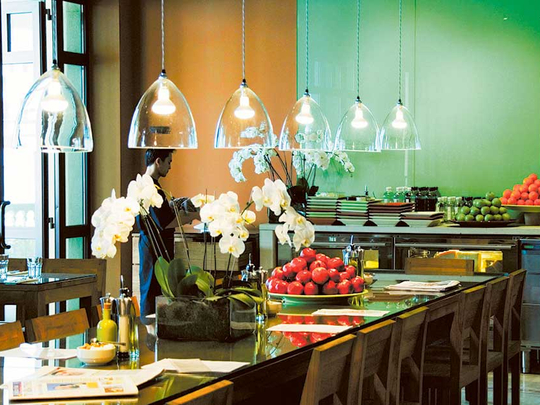
Yael Mejia is truly someone who changed how we eat in Dubai. When she arrived with her Baker & Spice brand in 2009, eating in a cafe that wasn’t inside a hotel was still rare, and organic, locally grown food, either on menus or to purchase, almost unheard of.
Now, of course, you can’t move for juice bars, independent restaurants and farmers’ markets, and much of the groundwork (in terms of distribution) and inspiration (for the competition) is attributable to Mejia and her gung-ho approach to locally produced food. She recently retired from her role at Baker & Spice, which now counts four outlets, passing the reins to Andre Gerschel, formerly of Okku and Jumeirah Restaurant Group, a New Yorker as enthusiastic and no-nonsense as his predecessor (just ask him about the asparagus that an Abu Dhabi farm is trialling at the moment).
We caught up with Gerschel at the Town Centre outlet on Jumeirah Beach Road, over a dinner of vegetarian dishes at the restaurant’s Meatless Mondays, one of the initiatives he’s launched since joining in March (it’s Dh79 for two courses). Calling it a creative outlet for his chefs, the menu changes on a monthly basis; right now, dishes include starters of no-egg omelette, with chickpea flour, scallions, tomato, chili and coriander; grilled paneer sandwich with tomato cashew sauce; and mains of Venezuelan corn arepas stuffed with avocado and black bean salsa; or beetroot Wellington with puff pastry crust, horseradish cream and peashoots.
Yael Mejia opened Baker & Spice in Souk Al Bahar 2009. That outlet is being renovated and is due to reopen next month.
What’s Yael Mejia’s legacy at Baker & Spice?
Yael was a coach and a mentor for a lot of brilliant young chefs. When I first met her, she said ‘my culinary fingerprints are all over the world’. Then I slowly bought into it, and then I started to see it. It’s like you found out that Andy Roddick, Pete Sampras, Michael Chang, [Novak] Djokovic and [Rafael] Nadal all had the same coach, but nobody knew who that coach was. That coach was Yael. [Baker & Spice] is a restaurant with legacy — in Dubai eight years is a long time. People thought she was insane not to serve Coca-Cola... she said ‘that’s not what I believe in’. I think a lot of people that fell in love with her over the years, of which there are many, they would say the real beauty of Yael is [she served] the truest form of the dish, untouched, simple, providing the best and closest product possible, at an accessible price point.
How has Baker & Spice grown?
[When Mejia started there were] five or six farmers with a product catalogue of six or seven items, now we are at 28 farmers with 150 products that you can get. Having local farmers, local talent, local chefs producing excellent work and getting to showcase it in an accessible manner is important and it’s been a big part of the ethos of the brand. Being the brand custodian, for lack of a better word, has been a tremendous honour.
What’s next?
We’ve been pretty conservative for a company that’s been here for eight years. We struggled through a tremendously difficult time in Dubai for restaurants, we came out of it, we worked with our suppliers, partners and landlords to make sure we weren’t one of those flash-in-the pan restaurants. We consider ourselves not expats but citizens of the restaurant scene. In terms of the future, one of the things we can definitely say is growth and expansion. Our regulars are really regulars. We have very vocal regulars who love B&S three, four times a week, which is a tremendous thing. It is a remarkable, against-all-odds, organic, organically grown restaurant... [we will expand] as shops, cafes and restaurants, depending on what the neighbourhood is calling for.
Do you plan to change the menu?
If we don’t have avocado toast on the menu, there are small riots. One of the great things about [the Meatless Mondays] menu is it was an opportunity to show that in times of economic saturation, we still want to feed people at Dh80. This was an opportunity to do not just the cold salads that people love us for but also hot, substantial main courses. I challenge any carnivore to come in; they will leave full. I challenged our chefs to come up with 10 starters and 10 main courses; they can’t exist on the menu and they can’t be from where they’re from. We wanted to try and reignite the culinary passion and showcase it.
What are the challenges of the local food movement?
When we started there was no pricing system, no invoicing. From an infrastructure point of view, we had to handle a lot of that burden in the beginning. Our Farmers’ Market that we host in the winter season it is a grass-roots initiative. We don’t charge them any rent to be there, and you can go there and haggle with them. The biggest issue is [farmers] didn’t have access to sell to restaurants. A lot of it has to happen with education tableside, where consumers need to embrace seasonality.













